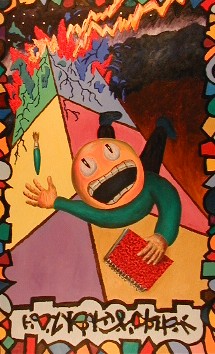Dystopias—And I’ve Written My Share
 Try on the idea that concern about, interest in, or desire for Apocalypse is really an ego trip. That you can’t imagine future generations superseding your mortal, contemporary consciousness. If I die, it all must die with me. Whether you postulate the apocalyptic dystopia coming next week or several hundred years from now, your basic urge is to assert the primacy of your consciousness over that of future generations. Basically, you do not wish future generations well. You refuse to seriously consider a prosperous human society in the year 9782.
Try on the idea that concern about, interest in, or desire for Apocalypse is really an ego trip. That you can’t imagine future generations superseding your mortal, contemporary consciousness. If I die, it all must die with me. Whether you postulate the apocalyptic dystopia coming next week or several hundred years from now, your basic urge is to assert the primacy of your consciousness over that of future generations. Basically, you do not wish future generations well. You refuse to seriously consider a prosperous human society in the year 9782.
Few science fiction dystopias seem to be set much further than a few hundred years ahead, as if that’s as far as we can imagine, or that we need to feel somewhat bodily close to the time period in question. The science fiction novels that do go extremely far into the future, thousands of years distant, generally have a more relaxed view of vast cycles of empires rising and falling, with human nature more or less staying stable. Many of these even postulate a complete forgetting of “Old Earth,” which becomes a sort of myth, and they make the reader feel comfortable with that concept. It’s never really a tragedy that Old Earth is forgotten; in a way it’s a relief.
In contrast, a true apocalyptic vision wants to posit an end to human nature. We want to ring down the curtain on the future because after all, we can’t be there for the party ourselves. This also applies to fear mongering associated with economic matters, warfare, technology, climate change, asteroid impacts, or political or social instability. We seem to have a need to postulate a civilization-threatening catastrophe in order to define our current egos as powerful and somehow “in control.” Future generations are seen as helpless children unable to work things out for themselves. We with our current fears know better.
Are we secretly wishing a living hell on our descendants in order to vindicate our anxiety?
To demonstrate this theory: consider a human civilization of the year 9782 as being thoroughly successful, dynamic, and happy, however you may define it: economically, technologically, psychologically. How do you really feel about that? Can you even begin to imagine how far off that is and what incredible things humans may have accomplished in the meantime? Don’t you feel a little let down that you won’t be at that party? That somehow they did it all without your “help”? That all your current opinions and concerns mean nothing to that time? Or worse: that humans of 9782 might ridicule or even pity our limited, primitive superstitions and anxieties?
Or does it somehow feel more comfortable for you to imagine some planetwide Stalinist gulag of eighty billion slaves rooting around like crazed zoo animals in some ruined, radioactive slag heap Gaia? Does that somehow give you a feeling of “control”?
Writing a science fiction dystopia does seem to offer psychic relief. You the creator god can line up all your toy soldiers and tanks and pour gasoline over it all and throw down the match. Somehow, like disaster movies, this soothes the ego. But stop to consider what it means to your human soul to not wish the future well.
copyright 2011 by Michael D. Smith

Pingback:Ancient Predictions for Spring 2020 – Sortmind Blog – Michael D. Smith
Pingback:A Writing Biography, Part VIII: The Exoskeleton, Archiving, Publishing, The Blog, and the Long Novels, 2011-2023 – Sortmind Blog – Michael D. Smith